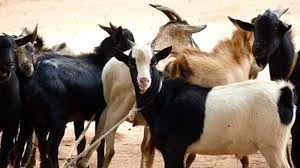- Web
- Feb 05, 2026
ECC set to approve goat exports to Kuwait, may impact local mutton prices
-

- Web Desk Karachi
- Feb 20, 2025

ISLAMABAD: The Economic Coordination Committee (ECC) of the Cabinet is scheduled to convene today, Thursday, and is expected to approve the export of goats to Kuwait by relaxing existing restrictions. This move aims to boost exports, which may lead to an increase in mutton prices in the local market and potentially affect the export of value-added products, as reported by the Business Recorder.
According to sources, the ECC had previously imposed a ban on the commercial export of live animals during a meeting on July 30, 2013, which was later confirmed by the federal cabinet. There is a notable demand for sheep and goats from Al-Mawashi, a major livestock importer based in Kuwait. Meeting this demand could enhance trade relations between Pakistan and Kuwait while also attracting foreign investment, introducing advanced feedlot systems, and creating significant employment opportunities.
The Special Investment Facilitation Council (SIFC) explored the proposal from Al-Mawashi to shift its source of importing live sheep and goats from Australia to Pakistan during its 10th Executive Committee meeting on June 26, 2024. This proposal was further evaluated in a subsequent meeting on January 22, 2025. The council has recommended that the Ministry of National Food Security and Research (MNFSR) consider this proposal and prepare a summary for lifting the existing ban on exporting live sheep and goats to Kuwait.
In light of the potential foreign investment from Al-Mawashi and the opportunity to bolster trade relations with Kuwait, the ministry examined the current statistics regarding the population of sheep and goats in Pakistan, along with the existing volume of meat exports. The ministry proposes to lift the ban on the export of up to 100,000 heads of fattened male sheep and goats annually, contingent upon a yearly review of the quota and adherence to specific conditions, which include:
1. The sheep and goats intended for export must come from fattening farms with at least 100 male heads, as verified by the relevant provincial authorities.
2. The male sheep and goats must be at least one and a half years old at the time of export, possessing two incisors and weighing no less than 50 kg.
Punjab launches Livestock card, farmers’ guidance app
The Ministry of Commerce, responsible for overseeing the export and trade of animals, has been consulted on this matter. While the Ministry acknowledges that allowing the export of live livestock may enhance foreign exchange earnings, it emphasizes that the government has been focusing on promoting the export of value-added products, such as meat, to maximize foreign exchange revenue. Thanks to the standardization of slaughterhouses, Pakistan achieved meat product exports worth approximately $507 million and finished leather exports totaling around $631 million in the 2023-24 fiscal year.
Concerns have been raised that permitting the export of live animals may negatively impact the nation’s value-added export sectors. If approved, there are worries that this could lead to a loss of foreign exchange that could otherwise be gained from the export of processed meat products, as opposed to merely live animals.
The MNFSR has been asked to evaluate how the export of live animals might affect domestic meat prices, the supply of livestock for slaughterhouses, as well as the exports of value-added meat and leather products within Pakistan’s industry. According to the MNFS&R report for the 2022-23 fiscal year, the per capita availability of meat in Pakistan was recorded at 22.79 kg per year, slightly below the required 23-24 kg. Additionally, given that food inflation reached 20 percent in the third quarter of the 2023-24 year, exporting livestock could further increase domestic meat prices.




